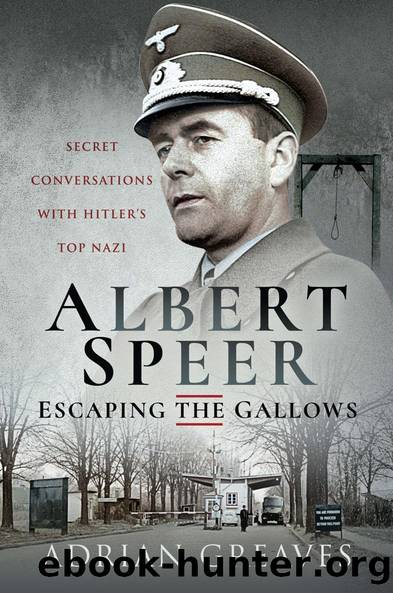Albert Speer â Escaping the Gallows: Secret Conversations With Hitler's Top Nazi by Adrian Greaves

Author:Adrian Greaves [Greaves, Adrian]
Language: eng
Format: epub
Tags: Biography & Autobiography, Military, History, World War II
ISBN: 9781399009560
Google: 1KUvEAAAQBAJ
Publisher: Pen and Sword Military
Published: 2021-08-30T01:51:30+00:00
Chapter Eight
Berlin
âThe most dangerous place on earth.â
President J.F. Kennedy, 1961.
By July 1945, the Russians had already occupied all of Berlin before they handed the other three sectors to the Americans, British and French (later collectively known as West Berlin). The British sector of West Berlin was then occupied by the Berlin Infantry Brigade, a garrison independent of the British troops stationed in West Germany, known as the British Army of the Rhine. The Berlin Infantry Brigade consisted of some 3,100 men in three infantry battalions, an armoured squadron, and a number of support units. This occupation lasted until the unification of Germany in 1990. The French Army also had units in Berlin, the Forces Françaises à Berlin, and the US Armyâs unit in Berlin was the Berlin Brigade.
Berlin now found itself isolated by being 100 miles behind the Iron Curtain in the middle of communist East Germany. In effect, the city became a West German island, surrounded by the Soviet Zone of occupation, with the Western Allies occupying and administering the three western sectors of the city. The Western Allies were each guaranteed an air corridor to their individual sectors of Berlin, and the Soviets also informally allowed road and rail access between West Berlin and West Germany. But tension remained high between the Western Allies and Russia, which gave rise to the post-war period becoming known as the âcold warâ.
West Berlin was now surrounded by Russian and East German military. While on regular border patrols, it was nevertheless easy for me to see that Berlin was a stunning city. Compared with London the city centre looked modern, while the outlying residential areas appeared to consist mainly of new tower blocks five or so storeys high; there were fewer cars to be seen, but a thriving and cheap tram system spread across the city. As I loved maps, it was easy to understand the layout of the city; the British section of the Berlin Wall went right through the centre of the city, which was dotted with famous landmarks including Charlottenburg Castle, Potsdamer Platz (Place), the Gedächtniskirche (Memorial church left untouched since bombed in 1944) on the Kürfurstendamm, the Brandenburg Gate, the Reichstag, the Russian War Memorial (and tank with, reputedly, the bodies of the tank crew still inside), and the Reichstag, or the remains thereof, which once housed the heart of the Nazi government.
When not on patrol, guard duty at Spandau Prison or exercises, life in the barracks was taken up with sport, drill and lectures. For the officers, the officersâ mess was a comfortable haven of normality, with excellent food prepared by our ever cheerful German chef, Günter. With Christmas 1961 approaching, the few junior officers and soldiers were offered the opportunity of spending Christmas Day with a German family. Numerous local families had participated in a scheme to âadoptâ a single soldier for Christmas. Always being ready for a new experience, I accepted the offer and was promptly invited to meet my allocated family in advance. I
Download
This site does not store any files on its server. We only index and link to content provided by other sites. Please contact the content providers to delete copyright contents if any and email us, we'll remove relevant links or contents immediately.
Fanny Burney by Claire Harman(26597)
Empire of the Sikhs by Patwant Singh(23074)
Out of India by Michael Foss(16848)
Leonardo da Vinci by Walter Isaacson(13318)
Small Great Things by Jodi Picoult(7122)
The Six Wives Of Henry VIII (WOMEN IN HISTORY) by Fraser Antonia(5501)
The Wind in My Hair by Masih Alinejad(5092)
A Higher Loyalty: Truth, Lies, and Leadership by James Comey(4954)
The Crown by Robert Lacey(4807)
The Lonely City by Olivia Laing(4798)
Millionaire: The Philanderer, Gambler, and Duelist Who Invented Modern Finance by Janet Gleeson(4466)
The Iron Duke by The Iron Duke(4349)
Papillon (English) by Henri Charrière(4263)
Sticky Fingers by Joe Hagan(4188)
Joan of Arc by Mary Gordon(4101)
Alive: The Story of the Andes Survivors by Piers Paul Read(4020)
Stalin by Stephen Kotkin(3957)
Aleister Crowley: The Biography by Tobias Churton(3634)
Ants Among Elephants by Sujatha Gidla(3462)
